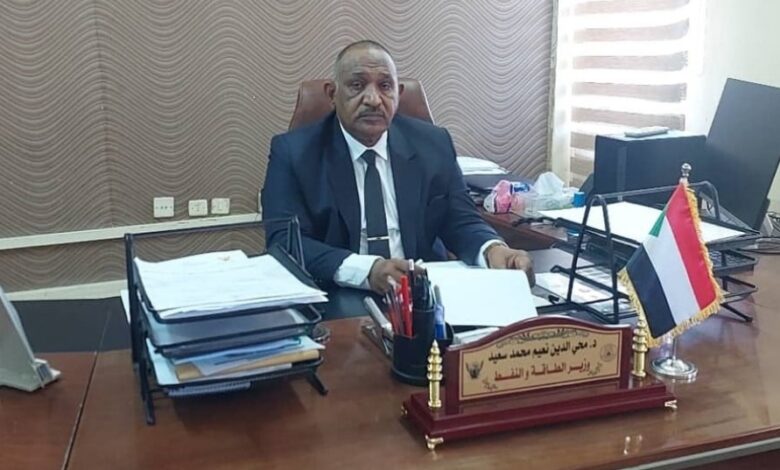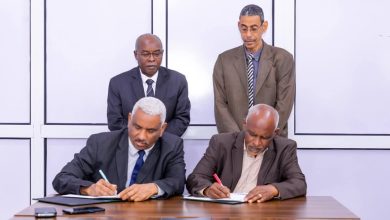Southern Oil Pipeline: Security Conditions Disrupt Pumping

Report – Rehab Abdullah
The main pipeline that transmits oil from South Sudan via Sudan for export has been halted since last March, due to the war between the Sudanese army and the Rapid Support Militia (RSF). The line was torn due to the blockage of an underground pipeline in the territory controlled by the RSF Militia north of the white Nile State. The Sudanese government announced serious efforts to repair the line and resume pumping southern oil, in that there are benefits gained by both parties, and there are losses and damages incurred by both parties, in addition to the fact that there are foreign partners, but the date for completing the repair has not been announced yet.
80 kilos only to complete the repair
Minister of Energy and Oil, Dr. Mohieddin Naeem Mohamed, stated that it is difficult to determine a specific time to restart the pipeline carrying the oil of the Republic of South Sudan through Sudanese territory. He attributed this in his speech to (Sudan Events) to the security situation and the inability of engineers to enter some sites until the required maintenance operations for the line are completed.
However, the minister confirmed that only 80 kilograms of the line remained to be repaired, expecting it to return to work soon, stressing that the big challenge lies in the security situation and said, “according to the program currently set to unload the line, we need a short period to complete this process, after which the line will be ready to receive southern crude oil and resume to operate normally.
Original story
The former Minister of State in the Ministry of Oil, Engineer Advisor Ishaq Jamaa, explained that the origin of the southern oil, which was transmitted to it after the oil exploitation project that was spent on the north at the time (Sudan), and the fields that went to the south is unity field in the Bentiu region adjacent to Heglig, and fields 3 and 7 in the “Felij” region. The crude oil is transmitted for export via the Heglig line in the western White Nile, and the Dar line via the eastern White Nile, Al-Jabalin station.
Ishaq added that the current situation has halted the line as a result of the rebellion, especially as there are southerners involved in the war with the RSF Militia. Ishaq revealed that information indicates that the southern authorities are aware of an external act to strangle Sudan from its neighbors, and the southerners are the first to be suffocated, but no account has been taken of Sudan for that. Ishaq confirmed that it is possible to repair the line, because the fault is not serious in terms of the line not being filled, and light crude can be passed to remove the freeze, if any.
The minister revealed that all the team working on the reform operations are 100% Sudanese and have rich experience since the first suspension that occurred in 2011.
The extent of the damage to Sudan
On the other hand, engineer Ishaq stated that Sudan is affected because the Umm Dabaker Barbek power station is fueled by Dar crude, and there are also 14 thousand barrels per day for the refinery in the form of purchase from the south only. The refinery is stopped due to the rebellion.
Ishaq added that, as experts, they alerted officials at the beginning of the Sudanese oil exploitation project that the project was carried out with the Chinese, and exploration continued by the Chevron company, but Chevron suspended the project using force majeure when oil prices fell in 1982, the so-called (oil glut). He added that now, according to their information, Chevron is playing with external actors in destroying Sudan. He pointed out that what matters to Chevron is destroying the investment structure that China has made in terms of the oil renaissance.
Sudanese experiences
Oil Minister Mohieldin revealed that the entire team working on the repair and unloading operations of the line is being carried out by 100% Sudanese hands and they have a wealth of experience since the first suspension that occurred in 2011.
Oil transmission revenue
As the Minister of Energy and Oil, Dr. Mohieddin Naeem Mohammad said that the return of oil transmission to the Sudanese government ranges according to the production rate and the export quantities that this line receives from southern oil, indicating that in the recent period, the return to the government of Sudan from processing fees in Al-Jabalain and transmission fees to the port of Bashaer amounts to about one million and half dollars a day.
The former Minister of State in the Ministry of Oil, engineer and consultant, Ishaq Jamaa, explained that the fees were 25 dollars ($15 for transmitting crude and ten dollars in compensation), calculated according to the transmission system from a mathematical perspective. The transmission fees were supposed to be a percentage of the transmitted crude, but the southerners rejected that, and in their opinion, if oil prices increased, the fees would increase. But they forgot that if prices fell, the fees would be fixed. This problem resulted when oil prices fell to $40 per barrel in 2014, and Dar crude prices were only $30, Ishaq suggested that the settlements were still pending.
Loss of $300 million annually
The economic expert, Dr. Haitham Fathi, stated that solving the problem of the line blockage requires operating pumping and heating stations at full capacity and providing sufficient supplies of diesel, indicating in his speech to (Sudan Events) that these issues face challenges due to the current war conditions in Sudan.
Fathi confirmed that the cessation of crude oil from South Sudan affected the Umm Dabaker station in the White Nile State, which produces electricity in Sudan, because the fuel for the station was part of a deal to pass crude from South Sudan through Sudanese territory.
Dr. Haitham Fathi confirmed the negative impact of stopping the export of oil through Sudanese ports on the Sudanese economy, in the sense that there is an agreement with the state of South Sudan that includes fees for transmitting oil, indicating that Sudan has been harmed through the loss of revenues from annual transmission through the line amounting to about 300 million dollars annually. He added that there is a risk that the oil transmission lines will be damaged to the rest of the transmission lines, and he pointed out that the flow of crude oil from production areas to export ports is governed by international agreements, and is in the highest interest of Sudan.
Fathi stressed that the stoppage has a greater impact on the economy of South Sudan, especially with the decline in oil production.
* Decline in southern oil production *
Economist Dr. Mohammad Al-Nayer greatly downplayed the impact of the cessation of South Sudan’s oil exports on Sudan’s economy, despite his acknowledgment of its impact on the economies of the two countries (Sudan and South Sudan).
Al-Nair acknowledged during his speech to (Sudan Events) the impact of stopping the flow of oil on Sudan’s economy, but he said that it was not to a large extent, and he attributed this to the fact that what Sudan gets from exporting South Sudan’s oil was not what it was in the past when South Sudan was producing at its maximum capacity. It is known that when South Sudan separated, its production was more than 330 thousand barrels per day, but it decreased due to the security disturbances that took place in South Sudan in Unity State and neighboring states.
For oil-producing Sudan, which led to the complete cessation of oil production in these areas, and consequently South Sudan’s oil production decreased to perhaps 150 or 100 thousand barrels, and thus Al Nayer confirmed that its impact on Sudan was not great, but he again acknowledged its benefit to Sudan, saying that it could have to help in such circumstances that Sudan is going through in improving the economic situation with regard to the foreign exchange revenues obtained as transit fees and sovereign fees for transmittig South Sudan oil.



